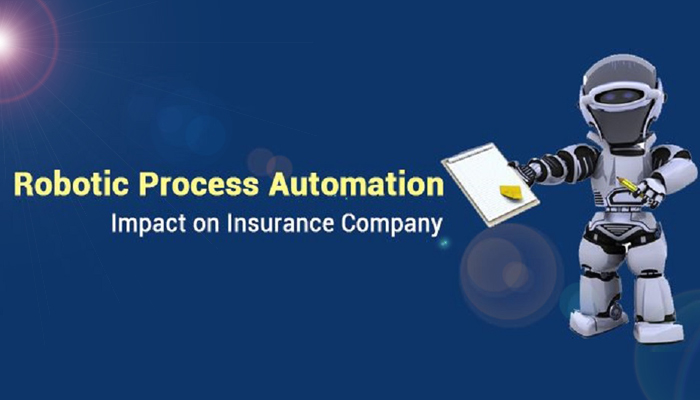
1000+
customers

50+ countries
across the world

Outsourcing leader
since 2008

Technology-driven
services

Stringent
quality processes
Impact of Robotic Process Automation on Insurance Companies
Last updated: 19 Jan, 2024 By Mohit Sharma | 6 Minutes Read

Robotic Process Automation in insurance is one of the most impactful technologies that have revolutionized the industry entirely. Insurance firms are pressured to collect, store, and organize vast amounts of data. RPA streamline processes and empower insurers to be more efficient. This improves their capacity to take on a more significant number of clients.
The insurance sector is now at an exciting digital crossroads. There is a lot of speculation regarding specific trends that will disrupt this insurance sector and redefine the process—especially underwriting policies for customers. Trends like machine learning, AI, and advanced data analytics are propelling major changes in the business landscape.
Customer engagement remains a top priority. Insurers should invest in essential digital automation technologies to digitize the industry.
RPA: A Path to Quick and Easy Operations
Insurance customers are looking for customized services they usually experience online. Contact centers can handle this by leveraging quicker, easier, reliable, and error-free technological interventions available round-the-clock. Robotic Process Automation (RPA) presents all these benefits to the insurance sector. It can automate recurring activities regarding rates, quotations, issuance, underwriting, policy administration, and claims management.
Mimicking human beings in carrying out role-based activities and processes, robots function as virtual representatives for gathering data. They process transactions, manage data, stimulate responses, and interact with other digital avenues. They are fast-paced, persistent, and efficient.
RPA easily integrates with current legacy platforms, is scalable, and presents a quicker execution cycle. It also integrates with systems for auditing and governance for smooth supervision. Also, it can recognize, maintain, and create data repositories from multiple sources, ensuring a seamless digital experience.
RPA assists insurance contact centers in collecting customer information from all feasible means for centralized support service. Furthermore, automation allows an in-house team to carry out high-value tasks.
What is the Impact of Robotic Process Automation on the Insurance Landscape?
The impact of Robotic Process Automation in insurance industry is transformative. RPA brings about significant improvements in various aspects of insurance processes, including:
Claims Processing:
By streamlining the document-intensive and time-consuming claims process, RPA ensures a 75% faster processing time than human efforts. By leveraging NLP and OCR, RPA reduces errors, verifies claims, and accelerates timely payouts, enhancing the customer-centric approach.
Underwriting Process:
Integrating AI and machine learning, RPA expedites underwriting by efficiently filling data fields, accessing internal and external data, evaluating loss runs, analyzing customer history, and providing pricing options. This ensures quick decisions and allows underwriters to focus on more complex tasks.
Regulatory Compliance:
RPA minimizes the risk of human error and regulatory breaches by automating compliance-related tasks. It generates compliance reports, ensures data security operations, validates customer data, and notifies account closures, providing insurers with an accurate and error-free compliance monitoring system.
Sales and Distribution:
RPA simplifies record creation, legal and credit checks, and compliance tasks in sales and distribution, eliminating errors and reducing operational costs. It significantly accelerates the process of requesting insurance quotes.
Finance and Accounts:
RPA efficiently handles financial tasks, such as processing invoices, payroll management, and financial transactions, reducing errors and minimizing the cost footprint. It aids in generating alerts on suspicious claims, improving overall financial management for insurance agents.
Policy Administration:
Automating administrative activities like rating, quoting, binding, issuing, renewing, and endorsing, RPA navigates across multiple applications, saving time and resources. The benefits of digitization in the insurance policy renewal process are evident as it addresses challenges related to scaling up and ensures smoother operations even with growing customer bases. This efficient use of technology enhances the renewal process, streamlining tasks and optimizing overall workflow.
Business and Process Analytics:
RPA facilitates efficient tracking and measurement of operational efficiency, identifying areas of improvement in the insurance industry. AI bots’ audit trails support regulatory compliance, improving customer response time and streamlining business processes.
Usage of Legacy Applications:
Serving as a bridge between legacy applications and new ERP or BPM solutions, RPA ensures seamless integration. It enhances back-office efficiency and customer experience by fitting into existing workflows, regardless of system compatibility.
Policy Cancellation:
RPA accelerates the time-consuming and repetitive task of policy cancellation, seamlessly navigating interactions with email, CRM, Excel, and PDFs. By reducing manual efforts, RPA provides faster resolutions to policy cancellation requests, improving overall efficiency in the insurance industry.
Bottom Line
Robotic Process Automation (RPA) stands as the driving force revolutionizing the insurance landscape, ushering in a substantial transformation in industry operations. The substantial enhancements in both efficiency and accuracy underscore the significance of embracing these advancements for future success, fostering smoother operations and delivering superior customer experiences.
In a world marked by constant change, the insurance industry must align with adaptable technology or risk being left behind. Continually pursuing innovative ways to enhance existing tasks is not just a goal but a necessity.
Businesses adept at keeping pace with technological innovations are poised for growth. At the same time, those lagging may not just find it challenging to stay afloat but risk becoming obsolete in an increasingly digital world.
If you are tired of manually handling critical insurance operations or need more accuracy in insurance underwriting, contact insurance bpo services provider, Cogneesol. We guarantee service quality and data accuracy for various outsourced insurance processes. Reach out to us today by calling +1-646-688-2821 or emailing us at [email protected].
Latest Blogs

This site is protected by reCAPTCHA. Google's Privacy Policy
and Terms of Service apply.








